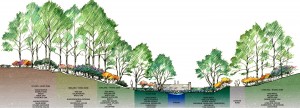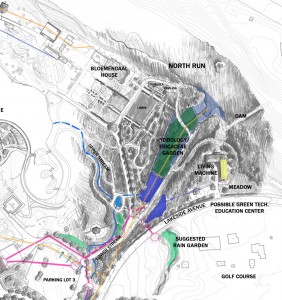Help us Build a Water Management Demonstration Garden at Lewis Ginter!
by Jonah Holland, PR & Marketing Coordinator, Lewis Ginter Botanical Garden
Have you ever had a dream to do something that you knew was the right thing to do, but it took years of working toward that goal to make it a reality? It seems like many of life’s great accomplishments start out as dreams requiring an incredible amount of time and persistence before they come to fruition.

At Lewis Ginter, we’ve had a dream like this for a while — it’s called our Water Management Plan & Demonstration Garden. In 2007 we received a grant from Henrico County and completed a hydrologic masterplan with Nelson Byrd Woltz Landscape Architects. The plan focuses on smart water use, conservation, filtering and rain gardens with the goal of helping to protect the watershed of the James River and the Cheasapeake Bay. Currently we are working on funding to make this exciting plan a reality. 
Lewis Ginter Botanical Garden is in a unique position to share best practices with the broad community. The Garden’s mission is focused on public education and it has the ability to demonstrate effective and replicable water management techniques to more than a quarter million visitors, including 42,000 school-age children, each year.
Of course with any project like this, finding the financial backing to make it a reality is key. That’s why we recently entered Rain Bird Intelligent Use of Water Awards. Rain Bird is giving away $50,000 for innovative water-saving projects like ours. We’ve entered our Water Management Demonstration Garden project in the $10,000 category. This is also where you fit into the picture: we need you to vote! (Voting takes just a second, no email is required and you can vote daily through March 22). 
But before you do, let me take a minute to let our Executive Director Frank Robinson tell you in his own words why this project is so important for Richmond and for the entire Chesapeake Bay Watershed.
Water flows downhill. Fundamental – but essential – especially if there are folks who live uphill or upstream from you. Another fundamental truth about water is that all water systems are interlinked. What our friends upstream put into the James River impacts our drinking water, and what we in Richmond add accumulates in the Chesapeake Bay. With bioaccumulation, the absorption of pollutants in plants and animals, what flows “downhill” also begins to show up in our food supply.
Not only do we hope to optimize the capture and use of water, the quality of recycled water used on our property, and the cleanliness of water that leaves our property, we hope to establish a model that can be replicated on hundreds of other properties in the region. We all have a responsibility to keep our water clean, and this is a first step to demonstrate the many ways in which we can most effectively manage our properties, large and small.
The good news is that there are many effective, low-cost, natural methods to help us in this pursuit – biofiltration of streams and ponds, soil amendments to increase absorption of surface water, the planting of trees and shrubs that naturally absorb carbon-dioxide and other pollutants, not to mention cooling our urban areas and reducing the amount of air conditioning required in warm weather (decreasing the use of electricity, fossil fuels and refrigerants).
Water management is a good investment. More than 2.5 million Virginians live in the 6.5 million-acre James River watershed.
So thank you for taking the time to consider voting for our project. When our dreams come true, we hope you’ll be among the first to visit and take pride in helping to make it happen.